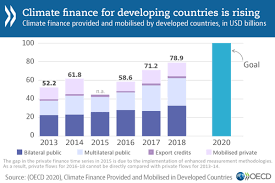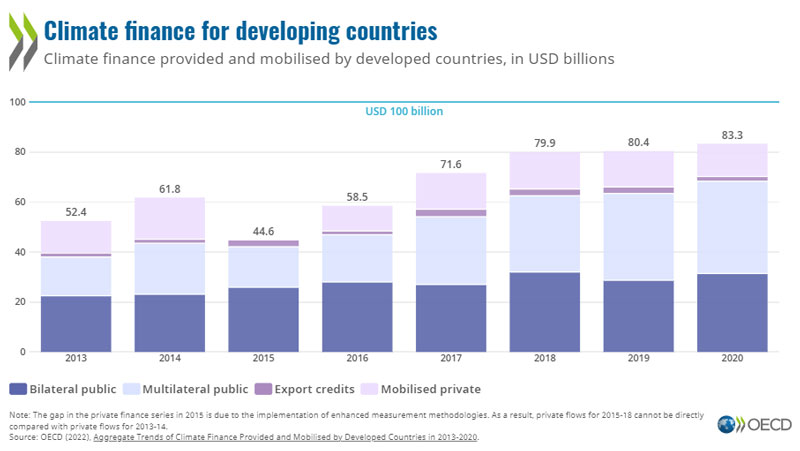
https://www.oecd.org/environment/statement-by-the-oecd-secretary-general...
This is a further 4% increase from 2019 and followed a 1% increase from 2018 to 2019. However, it still falls short of the goal for developed countries to provide and mobilise USD 100 billion a year for developing countries by 2020. The increase in 2020 climate finance was primarily driven by a rise in public flows.
Aggregate Trends of Climate Finance Provided and Mobilised by Developed Countries in 2013-2020 is the OECD’s fifth annual assessment of progress towards the UNFCCC goal.
This year’s Aggregate Trends of Climate Finance Report is being released earlier than in previous years in order to contribute to the UNFCCC Standing Committee on Finance Report, being prepared for COP27, on progress towards achieving the goal.
“We know that more needs to be done. Climate finance grew between 2019 and 2020, but as we had expected, remained short of the increase needed to reach the USD 100 billion goal by 2020,” OECD Secretary-General Mathias Cormann said.
“While countries continue to grapple with the economic and social implications of the COVID-19 pandemic and Russia’s war of aggression against Ukraine, we are seeing climate change causing widespread adverse impacts and related losses and damages to nature and people.”
“Developed countries need to continue to ramp up their efforts in line with their stated commitments in the lead-up to COP26, which would mean the USD 100 billion goal would be reached from next year. This is critical to building trust as we continue to deepen our multilateral response to climate change.”

Over the 2013-2020 period, public climate finance accounted for most of the total, increasing from USD 38 billion in 2013 to USD 68.3 billion in 2020. Within that overall amount, multilateral flows grew by 138% over 2013-20, while bilateral flows grew by 40%. Mobilised private climate finance, for which comparable data is only available from 2016, increased by almost 30% over 2016-20, despite a drop between 2019 and 2020. The share of climate-related export credits in the total remains small.
The majority of climate finance in 2020 was directed at climate change mitigation efforts, but finance provided for adaptation action continued to grow, accounting for a third of the total. Mitigation finance was mainly focused on energy and transport activities, while adaptation finance focused on activities in water supply and sanitation; and agriculture, forestry and fishing.
As was the case in previous years, in 2020 public climate finance mainly took the form of loans, accounting for 71% of the total, which was up 8% in volume terms from 2019. The volume of public climate finance provided as grants also grew in absolute terms accounting for 26% of the total.
Developing countries in Asia have been the main beneficiary of climate finance over 2016-20 with 42% of the total on average, followed by Africa (26%) and the Americas (17%). Grouping recipient countries by income level, 43% of 2020 climate finance provided and mobilised by developed countries for developing countries went to lower-middle-income countries (LMICs), 27% went to upper-middle-income countries (UMICs), 8% went to low-income countries (LICs) and 3% went to high-income countries (HICs).
The goal for developed countries to provide and mobilise USD 100 billion of climate finance annually for climate action in developing countries was due to have been met in 2020 and to be sustained through to 2025. OECD scenarios released in October 2021 showed that, if all commitments put forward by bilateral and multilateral providers up to that point are delivered, the USD 100 billion level would be met in 2023 and be exceeded in the period to 2025.
The OECD will continue to analyse climate finance developments over the next few months, with the outcomes to be released in September.
Download the Report: Aggregate Trends of Climate Finance Provided and Mobilised by Developed Countries in 2013-2020
Note to Editors
At the 15th Conference of Parties (COP15) of the UNFCCC in Copenhagen in 2009, developed countries committed to a collective goal of mobilising USD 100 billion per year by 2020 for climate action in developing countries, in the context of meaningful mitigation actions and transparency on implementation. The goal was formalised at COP16 in Cancun, and at COP21 in Paris, it was reiterated and extended to 2025.
At the request of developed countries, the OECD has, since 2015, produced regular analysis of progress towards this goal based on a robust accounting framework, consistent with the COP24 outcome agreed by all Parties to the Paris Agreement as regards funding sources and financial instruments. The OECD figures capture four distinct components of climate finance provided and mobilised by developed countries: bilateral public climate finance, multilateral public climate finance attributed to developed countries, climate-related officially supported export credits, and private finance mobilised by bilateral and multilateral public climate finance, attributed to developed countries.
For further information journalists are invited to contact Catherine Bremer in the OECD Media Office (+33 1 45 24 80 97).
Working with over 100 countries, the OECD is a global policy forum that promotes policies to preserve individual liberty and improve the economic and social well-being of people around the world.










Add new comment